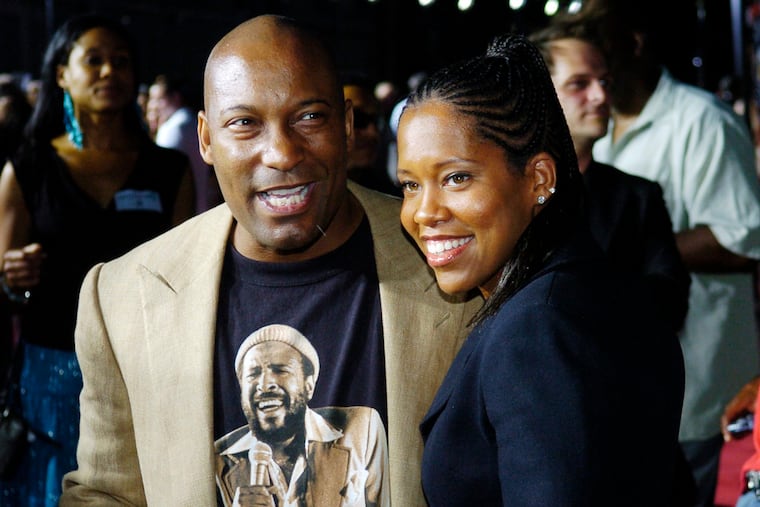John Singleton created love stories for the hip-hop generation | Elizabeth Wellington
I will remember Singleton, 51, who died Monday from complications of a massive stroke, for creating movies that spoke to my experiences as a young, gifted and black woman with hopes, dreams, and wide-eyed promises of true love.

Many will remember filmmaker John Singleton for his cinematic portrayal of the gritty realities of urban life in memorable, career-making flicks like Boyz n the Hood, Baby Boy, and Poetic Justice.
But I will remember Singleton, 51, who died Monday of complications from a massive stroke, for creating movies that spoke to my experiences as a young, gifted, and black woman with hopes, dreams, and wide-eyed promises of true love at a time when hydraulics, baggy jeans, and gang bangin’ were thought to define the golden age of hip-hop.
In Boyz, Singleton’s inaugural film, and for which he was the first black man nominated for a best director Academy Award, he introduced a Jheri-curled thug (rapper-turned-actor Ice Cube, in his breakout role) whose carelessness inadvertently causes the death of promising athlete Ricky (original hip-hop-era heartthrob Morris Chestnut).
But you didn’t have to roll with the Crips to appreciate the love story between Tre (Cuba Gooding Jr.) and goody-goody Brandi (Nia Long). Most of us were intimately familiar with Tre’s no-nonsense/try-me-again parents (Angela Bassett and Laurence Fishburne).
The magic of the filmmaker, who was only in his early 20s at the time, is that it painted a vivid picture of the inner lives of regular black kids. Violence and police brutality may have been the vehicles Singleton used to dig into the deep pockets of film execs and grab the attention of moviegoers, but his early movies offered us a heavy dose of romance and black life, too. And that, more than the crescendo of gunshots taking down a brother in the wrong place at the wrong time, melted the hearts of audiences on the East and West Coasts and everywhere in between.
Thanks to Singleton’s must-see 1990s movies, like Higher Learning (featuring Omar Epps and Tyra Banks) and Poetic Justice (Tupac, Janet Jackson, and Regina King), entire genres of movies were birthed, and an entire class of black actors had careers launched. Gooding went on to win an Oscar for best supporting actor in 1997. King, who made her film debut in Boyz, won a best supporting actress Academy Award this year for her work in If Beale Street Could Talk. Singleton is why we have the Oscar-nominated Taraji P. Henson, who, as a producer, is creating even more opportunities for actors of color.
There were the coming-of-age-in-the-streets stories, like Menace II Society (an early movie for Larenz Tate) and Jason’s Lyric (Jada Pinkett Smith and Allen Payne), in which the guilt-ridden protagonists were pressed to leave town to make a better life for themselves and their lovers. Those movies evolved into black rom-coms, where beautiful people fell in love to theme music featuring a tight bass. I’m thinking of Love & Basketball, The Wood, and Brown Sugar — all of which stop me dead in my tracks on lazy winter nights and still elicit tears.
Although now I’m crying over what once was, rather than what is.
These were movies where the guys — although rough around the edges — were just like friends of mine. They had heart. And they were afraid of love. And the women were perfect — albeit whiny and materialistic (but who wasn’t back then?).
John Singleton was born in Los Angeles to Sheila Ward, a pharmaceutical sales executive, and Danny Singleton, a real estate agent, mortgage broker, and financial planner. He attended the University of Southern California’s School of Cinematic Arts, where he pledged the Kappa Alpha Psi fraternity and began working on Boyz before graduating in 1990.
The next year, after the release of Boyz, he told Inquirer critic Desmond Ryan that Fishburne’s character was based on his dad.
“My father was a real strong black man,” he told said. “If I did something wrong, he would just turn his back on me. … There is nothing worse than having your father turn his back on you.”
He wasn’t lying.
After Boyz, Singleton directed the music video for Michael Jackson’s “Remember the Time” and Rosewood, the true story of a successful black town in Florida that was decimated by jealous whites in 1923.
By the mid-2000s, the black coming-of-age movie had peaked, and Singleton, an established filmmaker, had moved on, too — becoming a producer of movies like Hustle & Flow (starring Henson). In the latter half of his career, he worked in fits and starts, moving on to television. At the time of his death, Singleton was one of three creators of Snowfall, an FX drama that fictionalizes the early days of the crack epidemic in South Central Los Angeles.
He told Inquirer television critic Ellen Gray why he moved from movies to television series.
“For me, it’s the next best thing to doing a movie every other week,” he said. “You know, in the film business, you’re lucky if you have the chance to do a film once every two years, three years, sometimes four years. … I’m totally impatient … and I have so many stories in my head and my heart that I just gotta do it.”
And though that may be true, it was the stories he told in the early days that he will be most remembered for, as they not only launched Hollywood’s leading black stars’ careers, but also put a human face on an often-misunderstood generation.